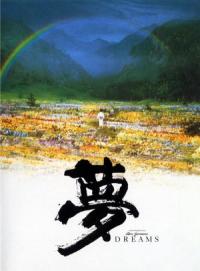 Happy new year! We kick off 2015 with Akira Kurosawa’s Dreams (Yume), which will be our film club title for January. So, gather the leftover cakes and cookies, make a cup of tea and throw the film into your player!
Happy new year! We kick off 2015 with Akira Kurosawa’s Dreams (Yume), which will be our film club title for January. So, gather the leftover cakes and cookies, make a cup of tea and throw the film into your player!
Towards the end of last year, we watched Kagemusha and Ran, which were something of a comeback for Kurosawa’s career. While promoting the latter film, Kurosawa often indicated that he had poured all of his remaining creative energy into the work, yet soon after its release the director was already working on his next feature.
For this next film, Kurosawa chose a project very different from almost anything that he had done before. Although some of his earlier works like Kagemusha and Drunken Angel had included dream sequences, Dreams would be entirely based on the director’s own dreams.
Perhaps due to its personal nature, for the first time in over forty years Kurosawa wrote the screenplay alone, a process which took him around two months. The film was personal also in other ways, as his son Hisao who had already helped in the production of Kagemusha and Ran, took the role of a principal producer together with Mike Inoue, Kurosawa’s nephew whose script had thirty years earlier worked as the basis for The Bad Sleep Well. Kurosawa’s daughter Kazuko was also involved, working at the wardrobe department under Emi Wada, who had just won an Academy Award for her work on Ran. By his side were also many long-time friends and associates, including Ishirō Honda and Teruyo Nogami.
Although the estimated budget of Dreams was lower than those of Kagemusha and Ran, Japanese studios were still unwilling to back a Kurosawa production, and so Kurosawa turned once again to foreign investors. This time, he found a supporter in American filmmaker Steven Spielberg, who convinced the entertainment corporation Warner Bros. to buy the international rights to the completed film. This made it easier for Hisao, who was by now about to take over as the head of Kurosawa Production, to negotiate a loan which would cover the film’s production costs. With financing thus secured, shooting began on January 10, 1989, and took more than eight months to complete. Dreams premiered at Cannes on May 10, 1990 to a polite but muted reception, which was repeated when the film was released around the world.
Kurosawa’s stock remained high, however. Two months before the premiere of Dreams, on March 26, 1990, Kurosawa attended the 62nd Academy Awards in Los Angeles, where he received an Honorary Award “for cinematic accomplishments that have inspired, delighted, enriched and entertained worldwide audiences and influenced filmmakers throughout the world”. The award was given to him by George Lucas and Steven Spielberg. In his brief acceptance speech, the 80-year-old filmmaker pondered whether the award was deserved and looked forward to continuing with his career: “I’m a little worried, because I don’t feel that I understand cinema yet. I really don’t feel that I have yet grasped the essence of cinema. Cinema is a marvellous thing, but to grasp its true essence is very, very difficult. But what I promise you is that from now on I will work as hard as I can at making movies and maybe by following this path I will achieve an understanding of the true essence of cinema and earn this award.”
Dreams is perhaps the most divisive of all of Kurosawa’s films, and thanks to its wide availability at a time when Kuroaswa’s earlier works were poorly available on home video, also one of his most watched. It is seen by many as simplistic, didactic and not very dreamlike, whereas others have praised it for its visuals, message and dreamlike nature.
What is your take on Dreams? Let us know in the comments or in the forums!
For more information about our Akira Kurosawa film club, see the film club page. For the home video availability of Dreams, see the DVD section.






Wow, that was kind of … disjointed. When it wasn’t random, it was didactic, but with the exception of Mount Fuji in Red, which didn’t much for me, I liked the didactic segments/dreams better than the others. The Tunnel, Crows, and Village of the Windmills were my favorites. While the obvious artificiality of some of the sets didn’t always work for me and the colors were hypersaturated, the scenes featuring grass and bright pastel flowers were visually arresting.
There’s been very little discussion of this film here previously. Anyone else have anything to contribute?